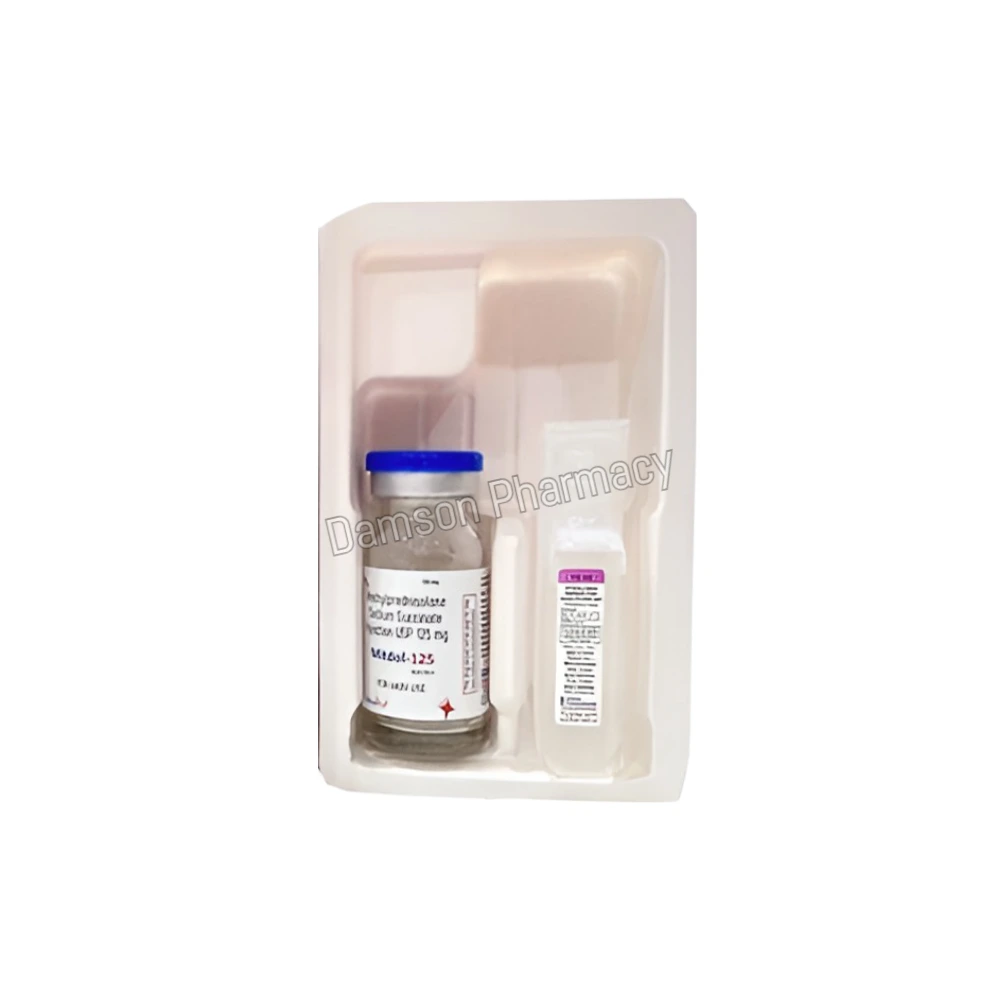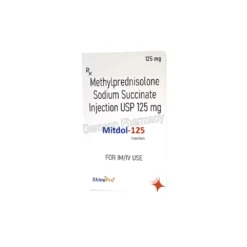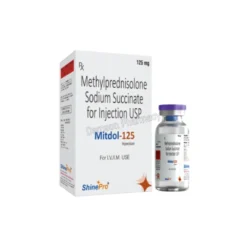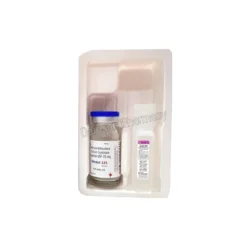Methylprednisolone 125mg Injection
$54.00 – $120.00Price range: $54.00 through $120.00
| Pack Size | Price | Price / Unit | Quantity | |
|---|---|---|---|---|
| 3 Packs | $54.00 | $18.00/ unit | ||
| 5 Packs | $75.00 | $15.00/ unit | ||
| 10 Packs | $120.00 | $12.00/ unit |
Looking for bulk / B2B pricing? | Send Inquiry |

| SKU | 11527 |
| Manufacturer | Shinepro Life Sciences Pvt. Ltd. |
| Categories | Inflammation |
| Delivery Time | 10 - 14 Working Days |
| Strength | 125mg |
Introduction to Methylprednisolone 125mg Injection
Mitdol 125mg Injection is a type of medicine called a steroid. It is used to treat different conditions including rheumatic disorder, asthma, severe allergic reactions and conditions that affect your eyes and skin.
Mitdol 125mg Injection is usually given as an injection by your doctor into a vein, joint, or muscle. The amount you are given will depend on what you are being treated for and how much you need to control your symptoms. If you are using this medication at home, learn exactly how to do it correctly from your doctor.
You should always take the amount prescribed. Do not take a larger dose or use it more often. Taking a higher dose will not improve your condition faster, and your risk of side effects will increase. Keep taking it regularly even if you feel well. Do not suddenly stop this medication as your condition may become worse. It should always be stopped gradually.
Uses of Methylprednisolone 125mg
Methylprednisolone 125mg Injection is a potent corticosteroid medication that is used in a variety of medical conditions where its anti-inflammatory and immunosuppressant properties are beneficial. Some common uses of methylprednisolone 125mg injection include:
- Severe Allergic Reactions
- Autoimmune Disorders
- Acute Asthma Exacerbations
- Inflammatory Bowel Disease (IBD)
- Severe Skin Conditions
- Certain Cancers
- Organ Transplantation
- Neurological Conditions
- Adrenal Insufficiency
How Does Methylprednisolone 125 mg Injection Works?
Methylprednisolone 125 mg injection works as a corticosteroid, which mimics the natural hormones produced by the adrenal glands. It primarily acts by reducing inflammation and suppressing the immune system’s response. This makes it effective in treating conditions that involve excessive inflammation or an overactive immune system, such as allergic reactions, autoimmune disorders, and inflammatory diseases.
Side Effects of Methylprednisolone
Common Side Effects
- Injection Site Reactions
- Gastrointestinal Disturbances
- Increased Appetite
- Insomnia
- Mood Changes
- Fluid Retention
- Elevated Blood Sugar Levels
- Increased Susceptibility to Infections
- Skin Changes
Serious Side Effects
- Severe Allergic Reactions
- Hyperglycemia
- Psychiatric Effects
- Bone Fractures
- Cataracts and Glaucoma
- Fluid and Electrolyte Imbalance
Dosage of Methylprednisolone 125mg
The dosage of Methylprednisolone 125 mg injection varies depending on the condition being treated and the patient’s response to therapy. Typically, the initial dose for acute conditions may range from 10 to 40 mg per day, administered intravenously or intramuscularly. Always follow the prescribed dosage instructions from your doctor.
Other Dosage of Methylprednisolone
How To Manage Side Effects?
Managing the side effects of methylprednisolone 125mg Injection involves a combination of strategies aimed at minimizing discomfort, monitoring for serious complications, and adjusting treatment as necessary. Here are some general guidelines for managing side effects:
- Monitor for Side Effects
- Follow Dosage Instructions
- Manage Gastrointestinal Symptoms
- Monitor Blood Sugar Levels
- Manage Fluid Retention
- Bone Health
- Adrenal Insufficiency
Warning & Precautions
Methylprednisolone 125mg Injections a potent corticosteroid medication that requires careful monitoring and adherence to warnings and precautions to ensure safe and effective use. Here are some important warnings and precautions associated with methylprednisolone 125mg Injection:
1. Serious Infections:
- Methylprednisolone can suppress the immune system, increasing the risk of serious infections. Patients should be monitored for signs of infection, and appropriate precautions should be taken to prevent exposure to infectious agents.
2. Adrenal Insufficiency:
- Prolonged use of methylprednisolone can suppress the body’s natural production of cortisol, leading to adrenal insufficiency. Patients should be monitored for symptoms of adrenal insufficiency, such as fatigue, weakness, nausea, vomiting, and hypotension.
3. Glucocorticoid Withdrawal Syndrome:
- Abrupt discontinuation of methylprednisolone therapy can lead to glucocorticoid withdrawal syndrome, characterized by symptoms such as fatigue, muscle weakness, joint pain, fever, and hypotension. Dosage should be tapered gradually under the supervision of a healthcare provider to minimize the risk of withdrawal symptoms.
4. Osteoporosis:
- Long-term use of methylprednisolone can lead to bone loss and increase the risk of osteoporosis and fractures, particularly in postmenopausal women and elderly individuals. Patients should be advised to maintain adequate calcium and vitamin D intake and engage in weight-bearing exercises to help preserve bone density.
5. Gastrointestinal Effects:
- Methylprednisolone can cause gastrointestinal irritation, leading to symptoms such as nausea, vomiting, and abdominal pain. Patients with a history of peptic ulcers or gastrointestinal bleeding should use methylprednisolone with caution.
6. Fluid and Electrolyte Imbalance:
- Methylprednisolone can cause fluid retention, electrolyte imbalances, and hypertension. Patients should be monitored for signs of fluid overload, such as edema and hypertension, and electrolyte levels should be monitored regularly.
Safety Advice
- Methylprednisolone can increase blood pressure and blood sugar levels, so regular monitoring is necessary, especially for patients with hypertension or diabetes. Adjustments to medications may be required.
- Do not stop taking Methylprednisolone suddenly, especially after long-term use, as this may cause adrenal insufficiency. Your doctor will guide you on how to gradually taper the dose to prevent withdrawal symptoms.
- Methylprednisolone suppresses the immune system, increasing the risk of infections. Report any signs of infection (fever, sore throat, unusual fatigue) immediately to your healthcare provider.
- Prolonged use of corticosteroids like Methylprednisolone can weaken bones, leading to osteoporosis. Ensure sufficient intake of calcium and vitamin D, and engage in weight-bearing exercises to maintain bone health.
- This medication can increase the risk of gastric ulcers or bleeding. Take it with food and avoid nonsteroidal anti-inflammatory drugs (NSAIDs) unless prescribed by your doctor.
- Corticosteroids like Methylprednisolone may cause mood swings, anxiety, or even psychosis. Be aware of any changes in mood, and inform your healthcare provider if you experience unusual feelings or behaviors.
FAQs – Frequently Asked Questions
1. Can Methylprednisolone 125mg Injection Be Used During Pregnancy or Breastfeeding?
Ans. The use of methylprednisolone 125mg Injection during pregnancy or breastfeeding should be carefully considered based on the potential risks and benefits to the mother and baby. It’s important to consult with a healthcare provider before using methylprednisolone Injection during pregnancy or while breastfeeding.
2. Does Methylprednisolone 125mg Injection Interact With Other Medications?
Ans. Methylprednisolone 125mg Injection may interact with other medications, including other corticosteroids, certain antibiotics, antifungal medications, anticoagulants, and vaccines. It’s important to inform your healthcare provider about all medications, supplements, and herbal products you are taking before starting treatment with methylprednisolone Injection.
3. What Precautions Should I Take When Receiving Methylprednisolone 125mg Injection?
Ans. Patients receiving methylprednisolone 125mg Injection should follow precautions such as monitoring for side effects, avoiding exposure to infections, maintaining bone health, monitoring blood sugar levels, and informing healthcare providers about any medical conditions or medications.
4. Can Methylprednisolone 125mg Injection Be Administered at Home?
Ans. Methylprednisolone 125mg Injection is typically administered in a medical setting by a healthcare professional. In some cases, if a patient requires ongoing treatment with methylprednisolone Injection, a healthcare provider may provide instructions for administration at home by a trained caregiver.
| Pack Size | 10 Packs, 3 Packs, 5 Packs |
|---|---|
| Price/Unit | $12/unit, $15/unit, $18/unit |
2 reviews for Methylprednisolone 125mg Injection
Add a review Cancel reply
Related Products
No related Products Found









Xolin Garrick –
Got this for my severe arthritis. The pain was almost gone within hours! It worked like a miracle. Had a great experience with Aarav.
Diego –
This company is very reliable.